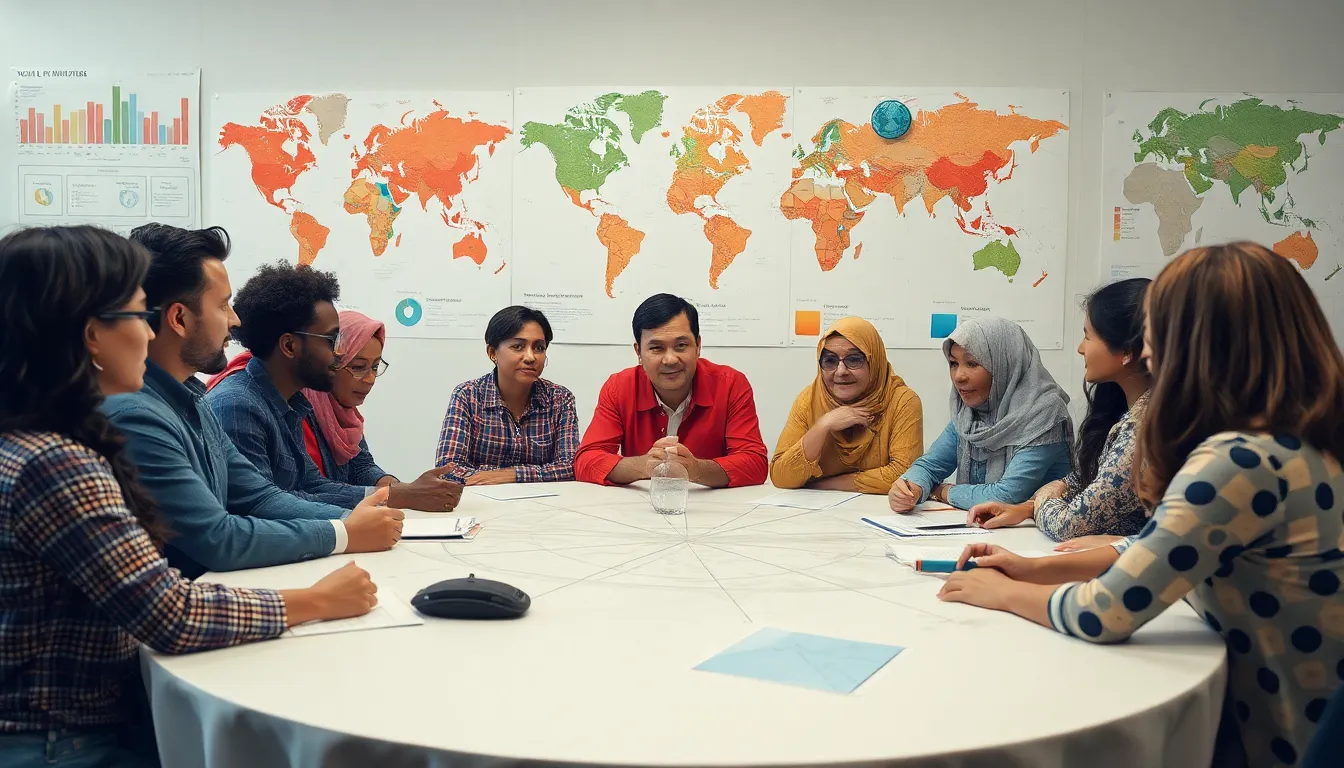Table of Contents
ToggleIn a world where the news cycle spins faster than a caffeinated hamster on a wheel, keeping up with global issues can feel like a full-time job—without the paycheck. From climate change to social justice, these pressing matters shape our lives in ways we often overlook. Understanding these challenges isn’t just for the policy wonks; it’s essential for anyone who wants to make a difference.
This Global Issues Review dives into the chaos and complexity, breaking down the big stuff into bite-sized nuggets of knowledge. It’s like a buffet of world affairs, minus the awkward small talk. So grab your metaphorical plate and get ready to feast on insights that’ll not only inform but also empower. After all, who said global issues can’t be both enlightening and a little bit fun?
Overview of Global Issues
Understanding global issues remains crucial in today’s interconnected world. Climate change presents one of the most pressing challenges, necessitating urgent action from governments and individuals alike. Rising temperatures, severe weather events, and shrinking ice caps illustrate the urgency of this matter, impacting ecosystems and human livelihoods.
Social justice also demands attention, encompassing inequality, discrimination, and human rights violations. Access to education, healthcare, and economic opportunities often varies significantly across regions, leading to disparities that must be addressed. Advocates push for policy changes to create a more equitable society, emphasizing that progress affects everyone on a global scale.
Another vital concern involves health crises, such as pandemics and disease outbreaks. Recent events like COVID-19 highlight the importance of global health systems and collaboration. Strengthening these systems enhances preparedness for future threats, benefiting nations collectively.
Resource scarcity continues to threaten stability as well. Water shortages and food insecurity pose significant risks, particularly in developing regions. Sustainable management and innovation in agriculture can alleviate these challenges, ensuring future generations access essential resources.
Globalization results in a complex interplay of these issues. Economic interdependence can both help and hinder progress. Trade agreements and international cooperation offer pathways for solutions. However, they may also exacerbate inequalities if not managed inclusively.
Engagement with these topics fosters informed citizens. Educational initiatives and accessible information play crucial roles in promoting awareness. Global Issues Review aims to break down these complexities, empowering individuals to grasp the world around them clearly.
Key Themes in Global Issues Review

Numerous vital themes emerge in the Global Issues Review, emphasizing significant challenges worldwide. Understanding these themes leads to better awareness and engagement.
Economic Challenges
Economic challenges present significant obstacles globally. Rising unemployment rates impact standards of living, straining families and communities. Inflation rates fluctuate, affecting purchasing power and savings. Trade disputes between nations complicate interdependence, hindering economic growth. Developing regions often face barriers due to limited access to capital and markets. In response, policy initiatives aimed at promoting equitable growth become essential. Addressing these economic barriers requires cooperation among nations to foster stability and progress.
Environmental Concerns
Environmental concerns significantly affect all aspects of life. Climate change results in extreme weather patterns, threatening agriculture and safety. Deforestation contributes to biodiversity loss, endangering numerous species. Pollution adversely impacts air and water quality, posing health risks for populations. Renewable energy sources gain traction, promoting more sustainable practices. Global initiatives focused on conservation and resource management strive to combat environmental degradation. Collaborative efforts among nations become crucial for safeguarding the planet’s future.
Social Inequalities
Social inequalities remain prevalent throughout the world. Income disparities lead to differing life outcomes for individuals and communities. Access to education varies, creating unequal opportunities for success. Marginalized groups frequently encounter systemic discrimination, affecting their rights and representation. Gender inequality continues to limit women’s access to resources and leadership roles. Advocacy for policy changes fosters inclusivity and promotes social justice. Collective awareness drives movements that challenge existing structures, aiming for a more equitable society.
Regional Perspectives
Understanding global issues requires a regional lens, as each area faces unique challenges and opportunities.
North America
In North America, climate change and social justice dominate discussions. Rising sea levels along coastlines threaten communities, while marginalized populations continue to battle systemic inequalities. Local governments implement green policies, aiming for sustainability and carbon neutrality. Efforts in social justice focus on reducing wealth gaps and enhancing access to education. Organizations advocate for comprehensive reforms, pushing legislative changes to ensure equality for all citizens.
Europe
Europe grapples with the dual challenges of economic recovery and environmental protection. The continent experiences heightened awareness of climate issues, prompting initiatives like the European Green Deal, which seeks to reduce carbon emissions by at least 55 percent by 2030. Economic disparities between western and eastern regions highlight the need for cohesive policies aimed at balanced growth. Countries collaborate on social welfare programs, addressing issues like migration and integration. Advocacy for human rights remains strong, with ongoing efforts to combat discrimination and promote inclusivity within societies.
Asia
Asia faces some of the most pressing environmental and social concerns globally. Rapid urbanization drives demand for resources, escalating competition and tension. Countries like India and China struggle with air pollution and health crises arising from industrialization. Initiatives promoting renewable energy are gaining traction, with investments in solar and wind power increasing. Social movements advocate for labor rights, pushing governments to safeguard workers’ freedoms. Collaborative efforts address regional inequalities, as nations work toward a more equitable future for all citizens.
Impact on Global Policy
Global issues significantly influence policy decisions across nations. Climate change drives governments to enact environmental regulations aimed at reducing carbon emissions. Social justice movements push for legislative reforms that address systemic inequalities, ensuring fair treatment for marginalized communities. Health crises, particularly the COVID-19 pandemic, highlight the necessity for international healthcare collaboration, improving response strategies.
Resource scarcity plays a crucial role in shaping policy, especially in developing nations where access to clean water and food security is limited. Countries often prioritize sustainability initiatives, emphasizing renewable energy sources to mitigate environmental impacts. Economic challenges, such as rising inflation, influence fiscal policies, prompting governments to seek innovative solutions to foster growth and stability.
Regional perspectives shape unique policy approaches to these global issues. In North America, local economies focus on green technologies, with policymakers advocating for investments in clean energy infrastructure. Europe’s commitment to the European Green Deal illustrates a broader strategy aimed at achieving climate neutrality by 2050, impacting various sectors such as transport, agriculture, and industry.
In Asia, nations embrace urban planning that integrates environmental sustainability with economic growth, addressing pollution while promoting public health. Countries like India implement policies that foster labor rights and social equity, responding to grassroots movements advocating for change.
Global interconnectedness fosters collaboration among nations as they face shared challenges. Joint initiatives, such as the Paris Agreement, demonstrate collective efforts to combat climate change and promote sustainable development. Policymakers recognize the importance of effective communication and solidarity as they navigate complex issues that transcend borders.
Navigating the complexities of global issues is essential for fostering informed citizens. The Global Issues Review serves as a valuable resource that simplifies intricate topics for everyone. By breaking down pressing challenges like climate change and social justice, it empowers individuals to engage meaningfully with world affairs.
Understanding these global dynamics is crucial in today’s interconnected society. As individuals become more aware of the implications of these issues, they can contribute to meaningful discussions and actions. The call for collaboration and advocacy remains strong, reminding everyone that collective efforts can drive positive change. Embracing this knowledge not only enriches personal perspectives but also strengthens communities and promotes a more equitable future.






